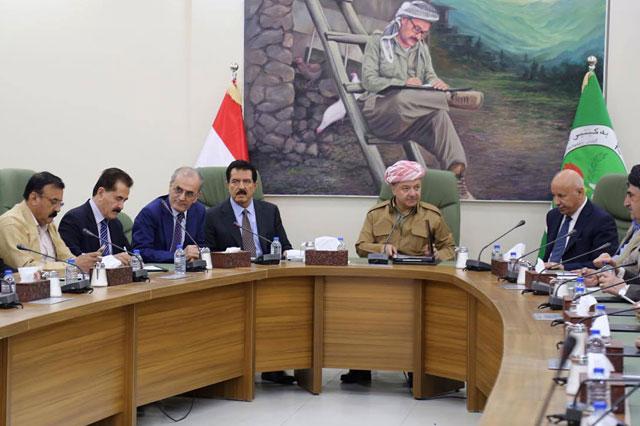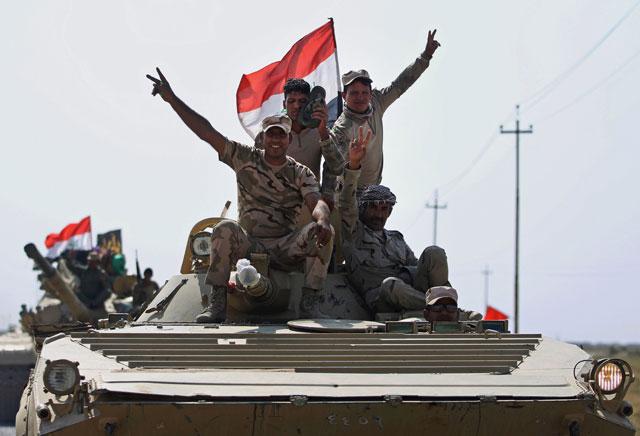You are here
Iraqi Kurds face more sanctions after calling elections
By Reuters - Oct 04,2017 - Last updated at Oct 04,2017

A picture taken on Monday shows Kurdish regional president, Massoud Barzani (centre), meets with Kirkuk provincial governor Najim Al Din Karim (3-left) and Kurdish political parties representatives in Kirkuk (AFP photo)
ERBIL, Iraq — Iraq’s autonomous Kurdistan region announced on Tuesday it was calling presidential and parliamentary elections for November 1 as the Kurdish leadership moved to capitalise on a referendum that delivered huge support for independence.
The central government in Baghdad imposed further punitive measures in retaliation for the independence vote last month by slapping sanctions on Kurdish banks and halting foreign currency transfers to the Kurdish region.
The referendum in the country’s Kurdish-held northern regions raised fears in Iraq and abroad of ethnic strains and a weakening of a US-backed campaign against the Daesh terror group.
The elections would be calculated to reinforce the legitimacy of the Kurdish leadership before a drive for outright independence and any negotiations that might involve.
Turkish President Recep Tayyip Erdogan said on Tuesday that his country would impose further sanctions on northern Iraq over the referendum. Powerful neighbours Ankara and Tehran fear it could fuel Kurdish separatism within their own borders.
The Kurdistan Regional Government (KRG) has not declared independence. The November polls are for the parliament and presidency of the region, not for an independent state.
Baghdad retaliated against the referendum with an international flights ban on Kurdish airports, while Iran and Turkey launched joint military exercises with Iraqi troops at their borders with Iraqi Kurdistan.
The Shiite Arab-led Iraqi government has rejected a KRG offer to discuss independence. It demanded Kurdish leaders to cancel the result of the referendum or face continued sanctions, international isolation and possible military intervention.
On Tuesday, Iraq’s central bank told the KRG that it would no longer sell dollars to four leading Kurdish banks and would stop all foreign currency transfers to the region, banking and government sources told Reuters.
Businesses in need of foreign currency and foreign workers, whose salaries are usually paid in dollars, will be hardest hit by the measure. The Iraqi dinar is not accepted outside the country.
In a further attempt to assert Baghdad’s authority, Iraqi Prime Minister Haider Al Abadi called for a “joint administration” in the multi-ethnic northern city of Kirkuk and other areas claimed by his government and the KRG, provided that Baghdad held the top role in such an arrangement.
Earlier, the federal parliament in Baghdad raised the threat of excluding Kurdish members who took part in the referendum, on the basis that it was unconstitutional.
The parliament decided to collect the names of those who voted in the referendum as a step towards their impeachment by the Higher Federal Court, Speaker Salim Al Jabouri told a news conference after the session, boycotted by most Kurdish MPs.
Jabouri said he was willing to open a dialogue with the KRG to resolve disputes but ruled out talks on independence.
Second term
Masoud Barzani, the heir of a dynasty which has led a Kurdish struggle for independence for over a century, has held the KRG presidency since its establishment in 2005, two years after a US-led invasion toppled Iraqi dictator Saddam Hussein.
Barzani’s tenure was extended beyond his second term in 2013 as fresh turmoil engulfed the region and Daesh overran about a third of Iraq the following year, threatening the Kurdish region. It was unclear whether Barzani would or could stand in the November poll as Kurdish law says a president cannot stay in office for more than two terms.
Campaigning for the two elections will start on October 15, the Kurdish Rudaw TV channel quoted the High Elections and Referendum Commission chief Hendrean Mohammed as saying.
Daesh’s self-declared “caliphate” effectively collapsed in July, when the group’s stronghold in Mosul, west of the KRG capital Erbil, fell to a US-backed Iraqi offensive with the participation of Kurdish Peshmerga fighters.
The Kurds’ push for independence is meant to capitalise on their contribution to the war on Daesh.
The US administration, which had strengthened its alliance with Iraq’s Kurds, is taking Baghdad’s side in the crisis by refusing to recognise the outcome of the referendum.
Iraqi and Kurdish media announced that former Iraqi president Jalal Talabani, a Kurd, had died on Tuesday in Germany at the age of 83.
Talabani, a veteran leader of the Kurdish struggle for self-determination, stepped down as president in 2014, after a long period of treatment following a stroke in 2012.
His wife and companion in political struggle, Hero, and his Patriotic Union of Kurdistan party had voiced only lukewarm support for the referendum.
Related Articles
PARIS/BAGHDAD — French President Emmanuel Macron on Saturday called on Iraq to dismantle all militias, including the government sanctioned I
BAGHDAD — Kurdish Peshmerga fighters rejected a warning from an Iraqi paramilitary force to withdraw from a strategic junction south of Kirk
BAGHDAD, Iraq — The semi-autonomous Kurdistan region of northern Iraq, which voted overwhelmingly in favour of independence last year in a r












